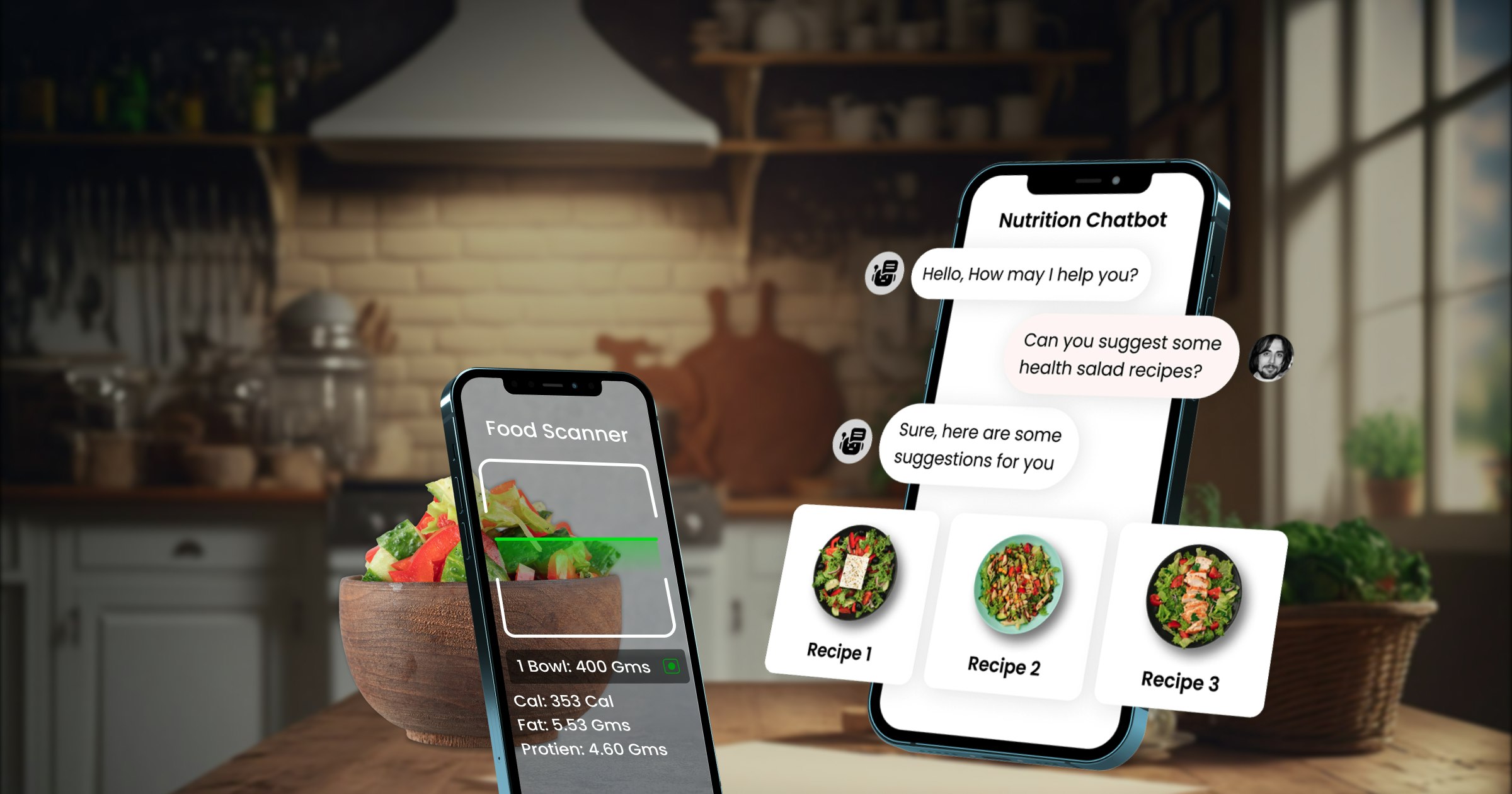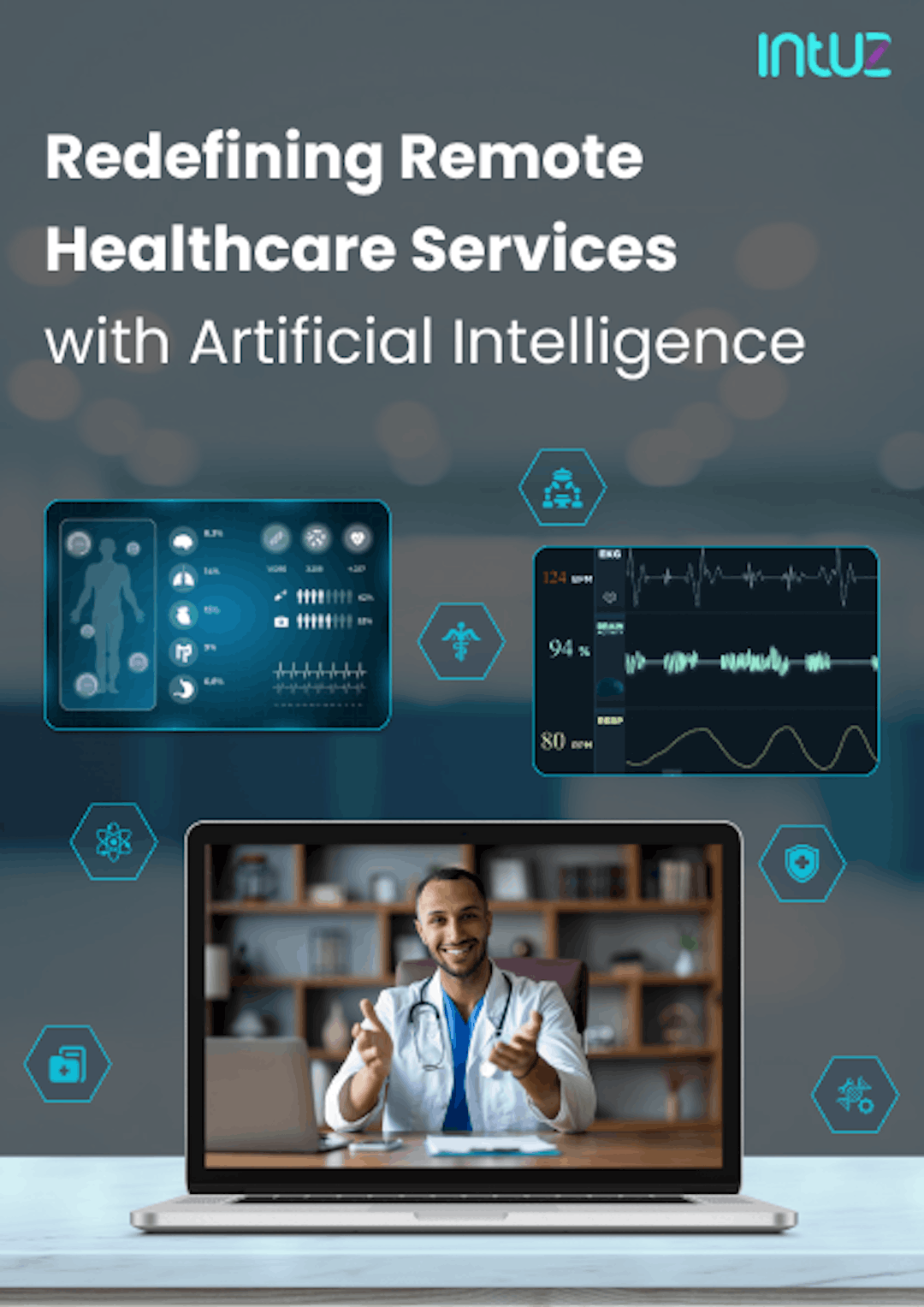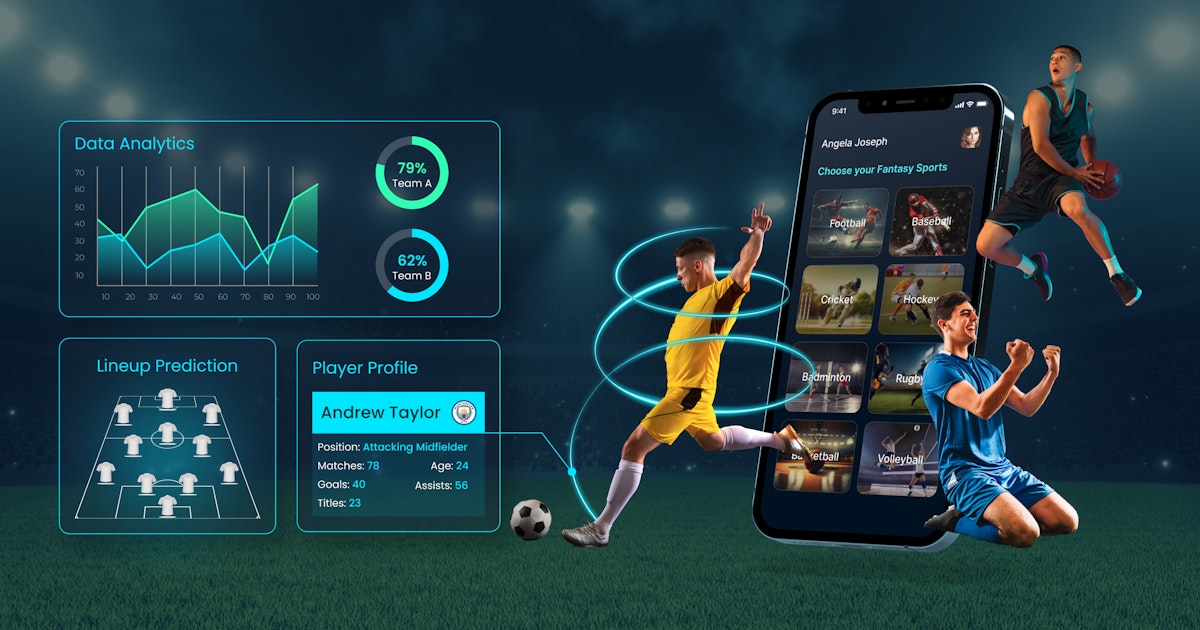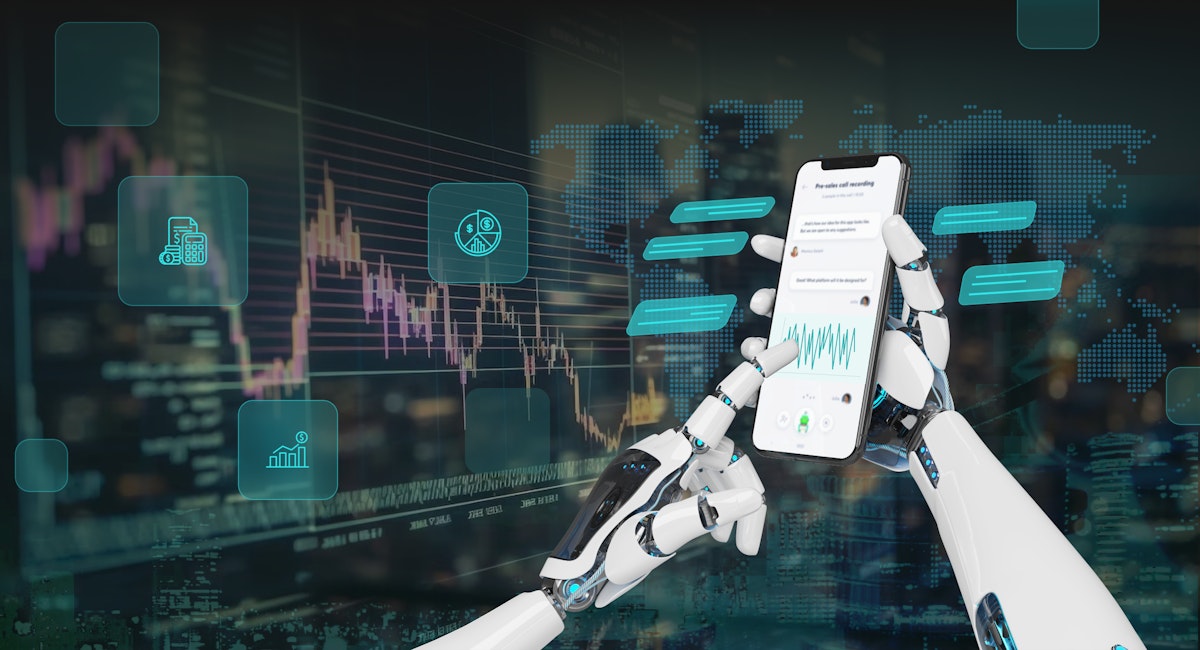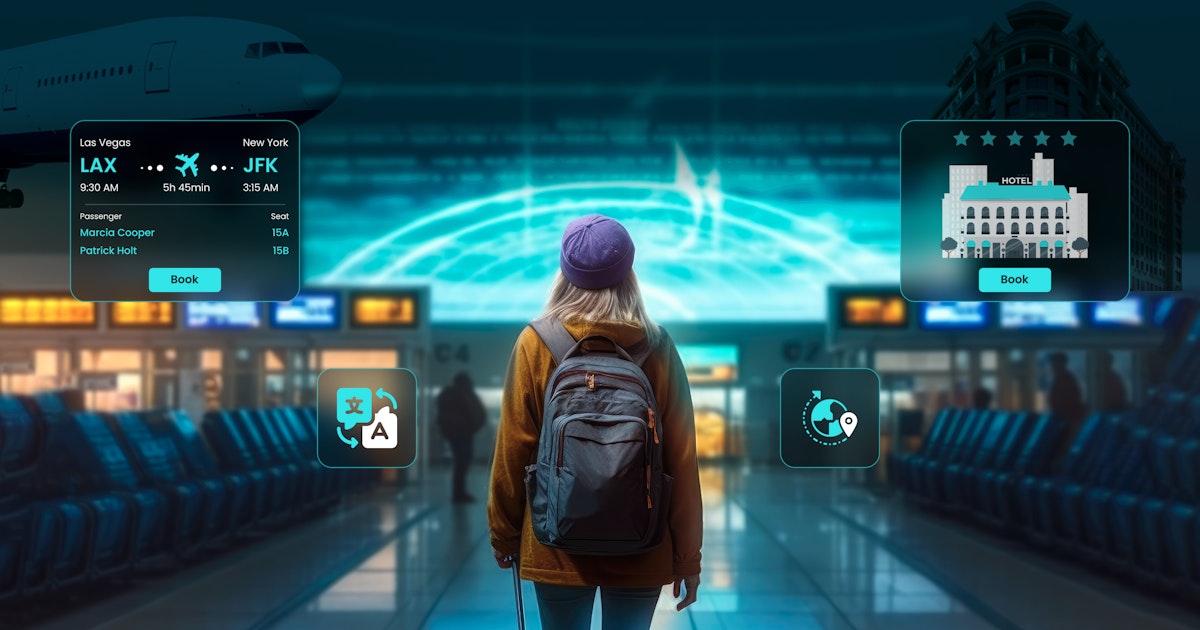Table of Content
Chatbots are guided software programs designed to simulate human conversations with other users. When enabled with artificial intelligence, these chatbots take a new dimension where machine learning and natural language processing helps nutrition chatbots better understand the requests and provide bespoke responses.
AI-powered chatbots are trained on large data sets, which helps them understand complex queries and recognize patterns, generating better and more accurate results.
The chatbot market size is expected to cross the $4.9 billion market by 2032 as compared to $0.84 billion in 2022.
As AI in healthcare chatbots combines the power of natural language understanding and machine learning, it has several applications for nutrition and healthcare.
A nutrition chatbot is programmed to stimulate behavior change in the users. It can personalize exercise routine and enforce it along with suggesting ways for smoking cessation and a healthy diet adoption.
AI-based nutrition chatbot provides personalized nutritional regimens for the users.
What are the AI nutrition chatbots?
AI nutrition chatbots are conversational AI systems designed to provide personalized dietary and nutritional guidance through natural language interactions. It is an intelligent virtual assistant that can understand and respond to user queries related to food, nutrition, and healthy eating habits.
When it comes to nutrition, we often find ourselves browsing through blogs or watching videos, or asking our friends or relatives about their diet, fitness routine, what they eat, etc. However, with nutrition chatbots, we can easily bypass everyone and get personalized answers for every question or query. Nutrition chatbots interact with the users just as the latter would interact with a dietician or a nutrition expert.
Through conversational AI, computers can understand human language, interpret the text, and provide a bespoke answer to the users. Moreover, developments of the last few years have enabled AI chatbots to achieve superhuman accuracy.
Conversational AI uses three technologies:
Automatic Speech Recognition (ASR)
Natural Language Processing (NLP)
Text-to-Speech (TTS)
Application of nutrition chatbot in health and wellness
Nutrition chatbots are designed to help users make better choices by providing personalized recommendations. Gaining back control of your diet and fitness requires physical activity and intrinsic motivation to achieve the goals.
AI chatbots are immune to any human feelings and can help users take control of their diet and fitness. These chatbots can act as your guide and motivator while delivering information to improve your lifestyle, diet, and sleep interventions. Let's explore this in brief.
1. Personalized dietary recommendations
The chatbot can analyze an individual's dietary preferences, allergies, health conditions, and goals to provide personalized recommendations for meals, snacks, and overall dietary plans.
2. Nutritional information lookup
Users can inquire about the nutritional content of specific foods or dishes, and the chatbot can provide detailed information on macronutrients (proteins, carbs, fats), micronutrients (vitamins, minerals), and caloric values.
3. Meal planning and recipe suggestions
Based on the user's dietary requirements, preferences, and available ingredients, the chatbot can recommend healthy and balanced meal plans or provide recipe suggestions tailored to their needs.
4. Nutritional coaching
The chatbot can offer guidance and support for individuals looking to adopt healthier eating habits, lose weight, or manage specific health conditions through diet modifications.
5. Food logging and tracking
Users can log their daily food intake, and the chatbot can analyze the nutritional content, provide feedback, and offer suggestions for improvements or adjustments to meet their goals.
6. Grocery shopping assistance
The chatbot can help users plan their grocery shopping lists based on their dietary needs and preferences, ensuring they have the necessary ingredients for healthy meals.
7. Restaurant and menu guidance
When dining out, users can consult the chatbot to find healthy options on restaurant menus or receive guidance on making informed choices based on their dietary requirements.
8. Educational resources
The chatbot can provide educational resources, articles, and tips on various nutrition-related topics, such as understanding food labels, portion control, or the benefits of different nutrients.
9. Integration with wearable devices
By integrating with wearable devices or fitness trackers, the chatbot can provide more comprehensive dietary recommendations based on the user's activity levels and energy expenditure.
These use cases demonstrate how an AI Nutrition Chatbot can serve as a valuable tool for individuals looking to improve their dietary habits, manage health conditions, or achieve specific nutritional goals through personalized guidance, education, and convenient access to relevant information.
AI in personalized nutrition care
AI systems can understand and process complex information with higher speed and accuracy. To provide personalized nutrition recommendations, AI chatbots can analyze individual data and understand your preferences to curate bespoke wellness schedules and programs.
AI-based personalized nutrition care takes into account user’s preferences, genetics, health data, microbiome, metabolic responses, body structure, etc., to help them choose the right foods and dietary preferences.
Within this, AI can also take the role of a virtual dietician. Packed with a nutritional database and access to information, virtual dieticians create personalized meal plans. There is no one-size-fits-all approach when it comes to nutrition. Hence, AI programs can take on different roles and help users live a healthier lifestyle.
Role of AI in healthcare
Artificial intelligence trains computer systems to understand users like a human would. With the combination of mathematics, big data, and computer science, AI programs can assist humans in completing tasks faster and gaining personalized information.
To make sense of the data and provide bespoke responses related to the healthcare domain, AI uses different algorithms.
1. Artificial neural networks (ANN)
ANNs filter information provided to the AI programs based on specific parameters. These programs require limited human supervision and can process large amounts of data in a short time span. In nutrition chatbot development, ANNs are used to analyze biomedical studies and text-to-speech recognition.
2. Logistic regression
This algorithm is required to predict the state of a variable, which in most cases is a binary variable. With this, the nutrition chatbots can assess the probability of an event and find answers to the classification problems.
3. K-nearest neighbors
This approach is for mining medical data, heart-condition classification, and predicting classes of unknown variables. As a result, in a chatbot, this algorithm can be useful in predicting medical conditions based on the information provided.
4. Discriminant analysis
When we need to distinguish between two or more classes or when finding specific classes or sets of characteristics, this algorithm is used. Through a nutrition chatbot, this algorithm can help figure out the manifestation of a disease or condition at its early stages.
Choosing the right algorithm is important for the successful implementation of nutrition chatbots; they also need data to provide accurate dietary recommendations. Good data quality fuels an organization’s or a chatbot’s capabilities to provide accurate analysis.
At the heart of every AI program is data. Using this data, we can bring out the best of AI in health. Key aspects of high-quality data include;
- Accuracy
- Completeness
- Consistency
- Reliability
- Timeliness
Accurate data leads to the best results, which means users can make better decisions. Nutrition chatbots based on inefficient data will generate inefficient results.
However, a question arises here: can AI overtake or beat doctors? In general, we are not at a stage where AI can beat doctors and other healthcare professionals. While we have seen incredible success where AI has delivered more accurate diagnosis and predictions.
Even though AI has proved to be better than doctors in some areas, patients are reluctant to trust and follow the healthcare recommendations provided by AI. A big reason behind this mistrust is the lack of human connection and lack of faith in AI algorithms that they cannot understand the unique needs of the patients.
Benefits of AI-powered nutrition chatbots
We prefer humanized care, where a dietician or a doctor checks us and then gives the requisite treatment. But with AI’s enhanced capabilities, capacity to process information, and impressive ability to understand patient’s needs, we can expect mass adoption of AI-powered nutrition chatbots in the future. Here are a few benefits of the same.
Availability 24/7
Chatbots are available 24/7, unlike doctors, who will only meet you after making an appointment, and that too within limited hours. So, a chatbot can respond to queries, answers, and recommendations at any time you need.
Moreover, with chatbots providing personalized care, they will send notifications and reminders at the right time.
Symptom assessment
With the integration of AI in healthcare, chatbots can assess symptoms and health conditions in real-time to provide bespoke treatment and management procedures.
Moreover, where patients are unable to share their symptoms, the chatbots can ask question prompts. Based on the responses to the questions, chatbots can provide personalized options and treatment plans.
Personalization
Nutrition chatbots are pre-programmed to provide effective care based on large amounts of annotated data. These programs offer personalized care solutions and treatment plans based on the patient’s or user’s requirements.
They gather exclusive data, analyze it, and give recommendations for the best results. Noom is an AI-enabled healthcare application that gives expert advice after considering the user’s weight, height, and aim.
It offers a weight loss program based on the principles of psychology to create personalized strategies for each user. The application channels each user’s mental health to adopt a healthy lifestyle.
Cost-effectiveness
Visiting a doctor for every small query or problem can be a costly affair. However, when you take assistance from AI chatbots, they can provide you with all the answers you need for free.
Data-driven insights
Every AI-based healthcare and nutrition application uses data to provide recommendations. The data AI algorithms are provided with during training, and the data these applications gather during functioning is processed.
The answers these applications provide are also based on the data. This means the users receive accurate and precise information.
Scalability
With the constant changes in AI, the healthcare sector is benefitting from several ends. Where medical coding is a crucial part of correct analysis and is automated by AI, the same can be scaled up or down as per the requirements.
The same momentum is applicable to all the other aspects of AI in healthcare, including nutrition. The operational capacity and analytics processes of the nutrition chatbots can also be scaled according to the requirements.
Leading Custom Fitness App Development Company
ExploreThe future of nutrition chatbots
Artificial intelligence is going to bring a lot of changes in the field of nutrition. AI programs can help people eat more healthily and sustainably. With benefits like personalized nutrition, condition analysis, and exercises based on health goals, nutrition chatbots are still in their early stage. As the technology gets better, the benefits and functionality of the same will also improve.
Are you a healthcare provider looking to enhance your nutritional counseling services with AI?
Book Your Free 45-Minute Consultation with Our AI Experts Today!
During this personalized consultation, you will receive:
A comprehensive evaluation of your practice's needs and AI readiness
Tailored advice on integrating an AI-powered nutrition chatbot into your existing patient communication channels (website, mobile app, patient portal)
A detailed and actionable AI implementation plan
